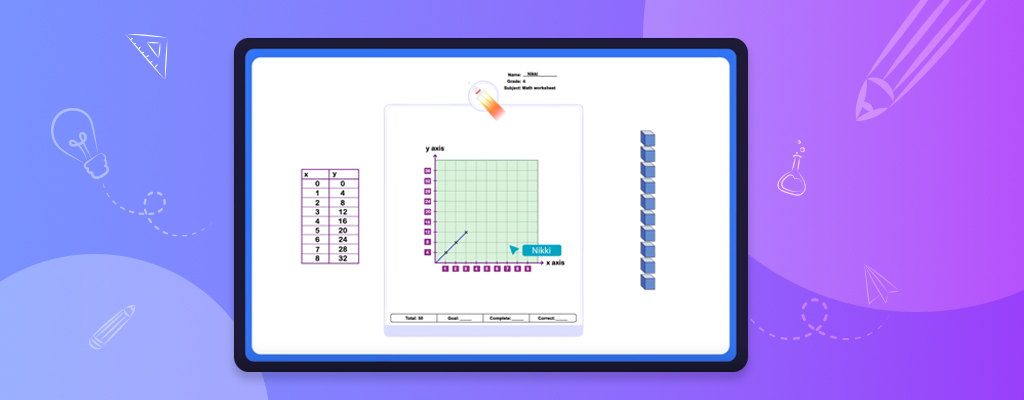Maximizing Online Whiteboards for Effective Teaching and Learning

TABLE OF CONTENTS
The rise of digital education tools, especially during the COVID-19
pandemic, has revolutionized the way teachers deliver lessons and
students engage in learning. Among these tools, online whiteboards for
teaching have proven to be a vital asset for educators.
These whiteboards provide a flexible, interactive platform that creates
collaboration, visual learning, and engagement. All these abilities make
the online whiteboard an ideal choice for effective teaching. Whether
you're a seasoned teacher or new to the concept of online teaching, this
guide will help you maximize your potential to improve student learning
outcomes.
Understanding Online Whiteboards in Teaching
Online whiteboards are digital platforms that simulate the traditional
classroom whiteboard, allowing educators to create, modify, and share
content in real-time. Unlike physical boards, these digital tools offer
enhanced features such as multi-user collaboration, document uploads,
annotations, and the ability to record sessions. The integration of
online teaching tools like these whiteboards into a learning environment
can significantly enhance the teaching process and drive
improved learning outcomes.
How Online Whiteboards Improve Learning Outcomes?
When used effectively, whiteboard software for teaching can help bridge
gaps in understanding and cultivate better learning outcomes. Here's
how:
-
Visual Learning: Online whiteboards allow teachers to
use visuals such as diagrams, charts, and drawings to explain complex
concepts, making them more accessible to students.
-
Active Participation: Unlike traditional teaching
methods, where students may passively receive information, online
whiteboards promote active participation through collaborative tasks,
annotations, and real-time feedback.
-
Accessibility and Inclusivity: Online whiteboards can
be used to cater to different learning styles (visual, auditory,
kinesthetic) and can be adapted to assist students with learning
disabilities or other challenges.
Best Practices for Maximizing the Potential of Online Whiteboards

While online whiteboards have immense potential, their effectiveness
depends on how they are used. Here are some best practices to help you
get the most out of these tools in your virtual classroom:
Lesson Planning
To maximize the use of an online whiteboard for teaching, it's essential
to integrate it into your lesson planning. Rather than using it as an
add-on, think of the whiteboard as a core teaching tool. Outline which
activities or topics can be enhanced by visual aids or collaborative
efforts, and use the whiteboard to support these areas.
For example, you can use the whiteboard to introduce new topics
visually, solve problems together with students, or recap previous
lessons with diagrams or mind maps.
Collaboration Opportunities
One of the most significant advantages of online whiteboards is their
ability to facilitate collaboration among students. Teachers can divide
the whiteboard into sections and assign different tasks to groups,
allowing students to work simultaneously. For instance, during a
brainstorming session, each group can add their ideas to a separate
section of the board, enabling comparison and discussion later.
Consistency
Using whiteboards consistently in your teaching routine helps create a
structured learning environment. Students become more familiar with the
interface and are likely to engage more when they know what to expect.
This consistency also ensures that whiteboards remain a valuable tool
for learning rather than just a one-time novelty.
Interactive Annotations
During live lessons, interactive annotations can make a significant
difference in the learning experience. Teachers can highlight key
concepts, circle important information, or add notes in real time,
ensuring that students follow along more closely. Annotations also allow
students to contribute by marking areas they find confusing, enabling
immediate clarification.
Utilizing Breakout Groups
Another effective way to enhance learning outcomes is by using the
whiteboard software for teaching in combination with breakout groups.
Teachers can split students into smaller groups and assign them separate
sections of the whiteboard to work on. This setup promotes independent
thinking and teamwork while giving students more ownership of their
learning process.
Encouraging Student Presentations
Online whiteboards also serve as an excellent platform for student
presentations. By allowing students to use the whiteboard to illustrate
their points, share ideas, or present solutions to problems, teachers
can encourage active participation. This practice not only enhances
communication skills but also boosts student confidence in their
learning.
The Role of Online Whiteboards in New Age Learning
Online whiteboards allow for real-time tracking of student work, making
it easier to monitor progress and provide effective teaching
interventions when necessary. You can observe how students interact with
the material, track who is participating, and offer feedback instantly.
Some whiteboards even allow you to save sessions for review, enabling
you to track improvement over time.
As hybrid learning becomes more prevalent, online whiteboards are
increasingly important. They provide a bridge between in-class and
virtual students, ensuring that both groups have access to the same
materials and experiences. Teachers can use the whiteboard to share
information with both audiences simultaneously, making the classroom
more inclusive and dynamic.
To Conclude
Online whiteboards are an invaluable asset in modern classrooms,
offering features that promote engagement, collaboration, and improved
learning outcomes. By integrating these tools into your lesson plans and
following best practices for usage, you can create a more interactive
and effective learning environment.
At Whiteboard.chat, we provide a
free online interactive whiteboard
with powerful features to enhance your virtual teaching experience. Our
platform supports real-time language translation and speech-to-text
functionality, ensuring accessibility for all learners.
Plus, we offer seamless integration with tools like Microsoft Teams and
Google Meet, making collaboration effortless. All these capabilities of
the Whiteboard.chat make it the perfect digital platform that fits the
needs of modern-day teaching.


 Try it Free (No Credit Card)
Try it Free (No Credit Card)